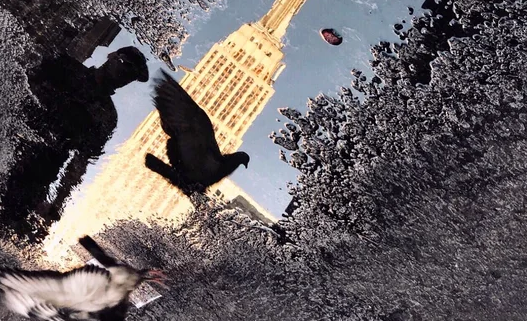Softer Selves
What shocks us is the insistent
tone of your voice, arousing
my own faults. Eating a diner
breakfast of ham, buttered toast,
and strawberry preserves, I see
you blonde, startling us with your
repetitious, admonishment-like
queries: Where’s the coffee?—
while your care-griever sits
with you. Your demands make
speech abrupt and hurtful
for a server who holds his tongue
on ice, freezing the pain of you.
I try to envision how your face
appeared before the onset—
cultured, primed, beautiful
as a dinner plate, but we
partition you, dividing your
voice into sentence sets:
Where’s the check?—always
misplaced and one step ahead.
Someone once asked, Is life
sweet enough? The last thing I
remember hearing was: Where’s
the ice cream?—spooning our
way into softer selves.

Ravenna
I moved to Minneapolis—often cold.
I undo the car battery, with a wrench,
to warm it up inside. I enter, walk
down the hall, battery under my arm,
passing the man with no legs. He sits
in his dark doorway, never smiling.
I sleep on a Murphy bed, with its
turning wall: a beveled mirror on one
side; the other, a bedframe. I pull it
down in my dim apartment, with cold
water and hot radiators. When I can’t
breathe, I turn on the light to see
these few colored postcards of mosaics
in Ravenna: of lapis, crystal, and stone.
The church walls shining in arches,
growing vines, peacocks, and vases.
Flip a card of power at Ravenna—
that a battery comes alive—flip a card
that a man without legs gets care—
flip a card that life becomes a crystal
mirror because we are only as human
as our glory reflecting in warm light.
Romanticism
Dear-dead uncle I never met,
here you are photographed
flat-cap snappy, as if I
snapped it for you, sitting
there cross-legged, white-
suited, your face, a silky-
mask cream of all our
hidden suffering. In this,
we are landscapes waving,
as we sit together, bending
closer to see our family’s
blue eyes, bending closer
to hear your father pounce,
your mother cry—because
of our own pink selves.
The Romantic Movement:
a moment for us to explore
our nature, sitting here in awe,
forgetting who lives in us, until
I remember the insults you
take, for me, more than your
worn shoes and scuffed fronts.
I hear pride rising and walking.
Cloister in Barcelona
Tonight, behind an iron gate,
let us tend a little cloister
of fountains and almond trees.
You can play a spirit who lives
here rearranging the bricks.
We do take a chance, though,
when someone new surprises
us, climbing down the tree.
Others speak of us not so well.
It’s our rosacea and silhouettes
imprisoned inside like a sigh
of almonds underfoot. Cracking
and sighing when I loosen shells,
speak the meat. Touch every
piece—but not after the cloister
bells ring—the crone coming,
wearing all black, showing us
out, fumbling her keys. We
are loved for who we are. It
clicks in us like a nut hitting
the ground—when someone
new climbs down the tree.
When Ants Began
Their slow disease,
spreading themselves
over counter and floor,
I spooned spent coffee
grounds outside the kitchen
window to repel the insidious
ones naturally, their black-eyed
glares behind sunglasses,
those antennae tuned
to censor us, marching
without thinking what
or who is being
stepped on. Still,
I want to believe
in the promise
of goodness
and great works
on this uncertain
soil—on these
feverish, toiling
hills.
*****
Jan Wiezorek writes from Buchanan, Michigan. His chapbooks, Prayer’s Prairie (Michigan Writers Cooperative Press) and Forests of Woundedness (Seven Kitchens Press), are forthcoming. Wiezorek’s work has appeared in The London Magazine, The Westchester Review, and elsewhere. The Poetry Society of Michigan awarded him, and he is a Pushcart Prize nominee. Visit janwiezorek.substack.com.


